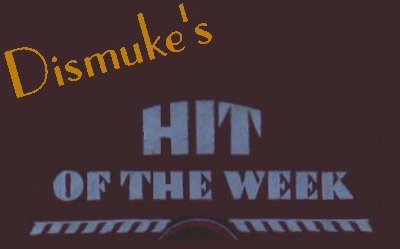

October 2001
October 25, 2001
This week's Hit of the Week is brought
to you by:
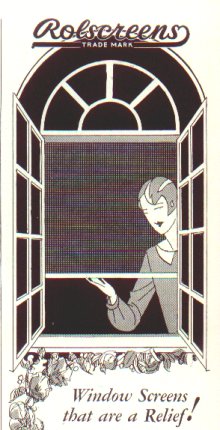
- No spring or fall window screening duties
- Rolscreens are built in with the windows
-They roll up and down
-All Metal Construction
ROLSCREEN COMPANY
46 Main Street, Pella, Iowa
(From 1928 ad)
Selections
From "Show Boat"
Paul Whiteman and his Concert Orchestra
1928
(Victor 35912-B mx 43123)
The tunes featured in this week's
recording may already be familiar to even the younger site visitors. "Show
Boat" was one of the most influential musicals of the 20th century.
It was the first major musical in which the acting and music revolved around
a strong central plot. The musical has been successfully revived
a number of times both on stage and on film. The original production
opened on December 27, 1927 at New York's Ziegfield Theatre and ran for
572 performances.
"Show Boat" was an instant success
and its songs were recorded by many of the popular bands of the day.
This recording comes from an oversized 12 inch 78 rpm record and was recorded
on March 1, 1928. The Whiteman band may have been in its "concert
orchestra" mode, but its roster included some of the top jazz talent of
the day. One of the highlights comes 1 minute 10 seconds into the
recording with the sudden, radiant blast on the cornet by the legendary
Bix Beiderbecke.
The flip side of the record features
the Whiteman orchestra with Paul Robeson singing the musical's most
famous song "Ol' Man River." When it was recorded, Robeson
was still part of the musical's London cast. It wasn't until
1929 that Roberson joined the American production. I will have to
feature it sometime in a future update.
October 18, 2001
This week's Hit of the Week is brought
to you by:
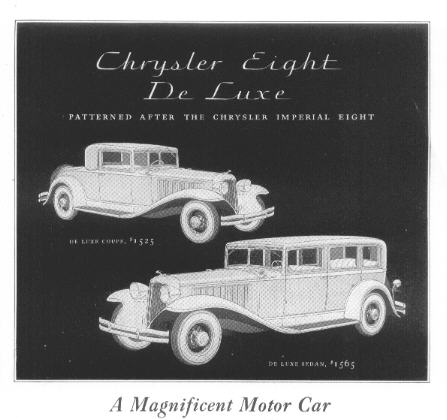
Chrysler Eight Deluxe ad - 1933
Beside
An Open Fireplace
Rudy Vallée and His Connecticut
Yankees
Rudy Vallée, vocal
1930
(Victor 22284-B)
 Audio
File Updated September 11, 2004 Audio
File Updated September 11, 2004
Over
Somebody Else's Shoulder
Will Osborne and His Orchestra
Will Osborne, vocal
1934
(Melotone M-12935 mx 14826)
During the early days of network
radio, there were several on-air "feuds" between big name stars.
These feuds were not only entertaining for audiences, they also generated
lots of publicity and name recognition for the participants. Two
of the longest running and most famous were the Jack Benny-Fred Allen feud
and the feud between Bob Hope and Bing Crosby. Bandleaders
also got into the act - for example, Ben Bernie had a long running feud
with columnist Walter Winchell. The subject of this week's
update is the feud between crooners Rudy Vallee and Will Osborne - both
of whom had their own dance bands.
Rudy Vallee catapulted to fame in
1928 when his band, which was performing at New York's Heigh Ho Club, landed
a program on a national radio broadcast emanating from radio station WABC.
In 1929, Vallee and his band left for Hollywood and a starring role in
the film "Vagabond Lover." His replacement at the Heigh Ho Club and
on the broadcasts was Will Osborne, who had a vocal style remarkably
similar to Vallee's. Soon a debate broke out between Vallee's and
Osborne's respective fans over who was the better vocalist and who deserved
credit for inventing crooning - the soft style of singing made possible
by the advent of the microphone. The truth is that neither man deserved
credit for inventing the style - artists such as "Whispering" Jack Smith,
Johnny Marvin and Gene Austin all preceded them by a few years.
Vallee and Osborne both had a very
nasal style of singing. I have always thought that Vallee sounded
like he had a clothes pin on his nose, although I do enjoy many of his
records. Osborne sounded that way as well - but his voice was
a bit deeper. So who was the better crooner? Well, you
decide.
October 11, 2001
This week's Hit of the Week is brought
to you by:
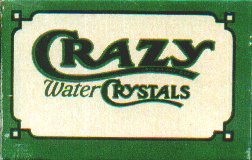
Crazy Water Crystals
are the minerals extracted by evaporation from the natural Crazy Mineral
Water at Mineral Wells, Texas. Not one grain of any other thing is
added. One standard size package contains the minerals extracted
from approximately 12 gallons of natural Crazy Mineral Water. Simply
add to ordinary drinking water in about that proportion.
Mineral Water,
made from Crazy Water Crystals, gently but thoroughly flushes accumulated
waste from the bowels. It neutralizes acidity. It is not irritating,
and it is not habit forming. It is pleasant but thorough, and entirely
without unpleasant after-effects.

CRAZY HOTEL
The Home of Crazy Water Crystals
MINERAL WELLS, TEXAS
|
The Crazy Water Company
(From 1930s product packaging and
promotional literature.)
Cheer
Up
Hollywood Dance Orchestra
1926
(Regal 8184-B mx 6847)
 (Audio
file updated 8/29/02) (Audio
file updated 8/29/02)
The recording quality on the
lower priced labels of the mid-1920s may not have always been the best
- but the dance tunes often had a certain upbeat spirit that has
absolutely no counterpart in the popular music of today.
October 4, 2001
This week's Hit of the Week is brought
to you by:
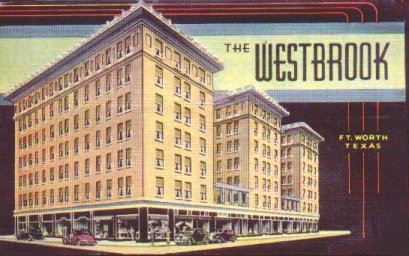
THE WESTBROOK
Rates $1.50 to $3.00
"Fort Worth's Friendly Hotel"
What Good Am I
Without You?
Dan Ritchie & His Orchestra
Helen Rowland, vocal
1930
(Romeo 1530-A mx 10319-2)
What Good Am
I Without You?
Fletcher Henderson & His
Orchestra 1930
(Columbia 2352-D mx 150998)
As any regular visitor to this
site can testify, one of the nice things about popular music from the Great
Depression is that it was, more often than not, anything but depressing.
But there were exceptions. Both of the recordings featured this week
are quite melancholy and, I think, capture the mood of what the early
1930s must have been like for many.
Helen Rowland is one of my favorite
Depression era vocalists and was a fitting choice for this song. (You can
also hear other recordings by her in the June 2001 and December 2000 updates
in the archives at the bottom of the page.)
"Dan Ritchie" was a recording
pseudonym used at various times by the Will Osborn, Nye Mayhew and Vincent
Rose orchestras on Romeo, Perfect, Melotone and other bargain labels issued
by the American Record Corporation. I am not sure exactly which band
is featured on this particular recording.. (Note: A
visitor was kind enough to write in and inform me that it was the
Sam Lanin Orchestra.)
The Fletcher Henderson instrumental
version, while being somewhat more upbeat and jazzy, is still very much
on the gloomy side.
I promise that I will feature
something a bit more cheerful next week.

|






